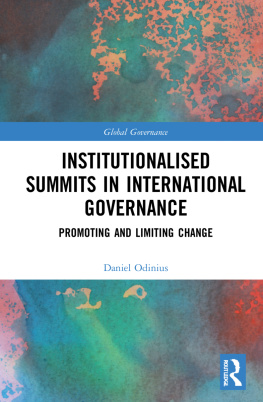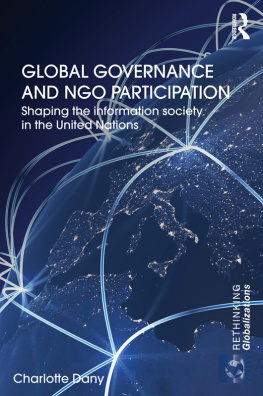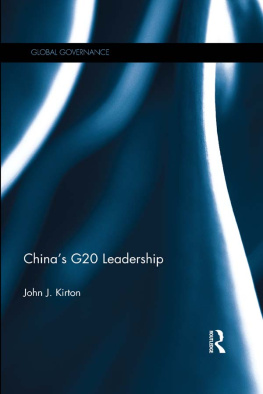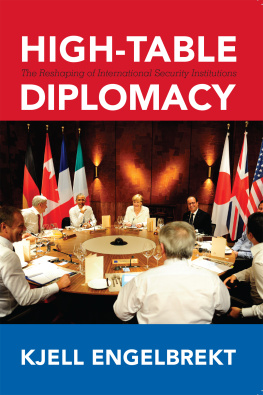Institutionalised Summits in International Governance
This book analyses the role of institutionalised summits in international governance, adding a fresh perspective to the controversial debate over the value of institutionalised summits for international governance.
It argues that the contribution of these summits to negotiating and implementing international agreements on policy change is ambivalent. Based on an innovative theoretical model the book proposes that states strategically select summits with their specific institutional design for advancing their policy preferences. Developing the route to the summit and the route from the summit as precise causal mechanisms, the author argues that these choices explain the ambivalence of summit involvement. With empirically rich case studies on the Group of 7 (G7) and the European Council, the book provides a rare systematic comparison of different summits. The empirical record shows strikingly similar patterns for the G7 and the European Council, but it also points to variation deserving further attention in the study of summits in different institutional environments.
It will be of interest to researchers in International Relations, Global Governance, and European Politics, and those interested in global institutions and decision-making.
Daniel Odinius holds a PhD in Political Science from the University of Bamberg, Germany, where he also completed a Masters degree focusing on international and European politics. He was a visiting researcher with the G7 Research Group at the Munk School for Global Affairs and Public Policy, University of Toronto. In his current position at the German Federal Ministry of Labour and Social Affairs in Berlin, Daniels work concentrates on European cohesion policy. His research interests include international institutions, international negotiations, European politics, and foreign policy.
Global Governance
Series Editor: John J. Kirton, University of Toronto, Canada
Global governance is growing rapidly to meet the compounding challenges of a globalized 21st-century world. Many issues once dealt with largely at the local, national or regional level are now going global, in the economic, social and political-security domains. In response, new and renewed intergovernmental institutions are arising and adapting, multilevel governance is expanding, and sub-national actors are playing a greater role, and create complex combinations and private partnerships to this end.
This series focuses on the new dynamics of global governance in the 21st century by:
- Addressing the changes in the structure, operation and impact of individual intergovernmental institutions, above all their innovative responses to the growing global challenges they confront.
- Exploring how they affect, are affected by and relate to non-state actors of global relevance and reach.
- Examining the processes of cooperation, competition and convergence among international institutions and the many global governance gaps where global challenges such as terrorism, transnational crime and energy do not confront powerful international institutions devoted to their control.
- Dealing with how global institutions govern the links among key issues such as climate change and health.
In all cases, it focuses on the central questions of how global governance institutions and processes generate the effective, legitimate, accountable results required to govern todays interconnected, complex, uncertain and crisis-ridden world.
Institutionalised Summits in International Governance
Promoting and Limiting Change
Daniel Odinius
For more information about this series, please visit: https://www.routledge.com/Global-Governance/book-series/ASHSER1420.
First published 2022
by Routledge
2 Park Square, Milton Park, Abingdon, Oxon OX14 4RN
and by Routledge
605 Third Avenue, New York, NY 10158
Routledge is an imprint of the Taylor & Francis Group, an informa business
2022 Daniel Odinius
The right of Daniel Odinius to be identified as the author of this work has been asserted by him in accordance with sections 77 and 78 of the Copyright, Designs and Patents Act 1988.
All rights reserved. No part of this book may be reprinted or reproduced or utilised in any form or by any electronic, mechanical, or other means, now known or hereafter invented, including photocopying and recording, or in any information storage or retrieval system, without permission in writing from the publishers.
Trademark notice: Product or corporate names may be trademarks or registered trademarks, and are used only for identification and explanation without intent to infringe.
British Library Cataloguing-in-Publication Data
A catalogue record for this book is available from the British Library
Library of Congress Cataloging-in-Publication Data
Names: Odinius, Daniel, author.
Title: Institutionalised summits in international governance : promoting and limiting change / Daniel Odinius.
Description: Abingdon, Oxon ; New York, NY : Routledge, 2022. |
Series: Global governance | Includes bibliographical references and index.
Identifiers: LCCN 2021019994 (print) | LCCN 2021019995 (ebook) | ISBN 9780367765200 (hardback) | ISBN 9780367765217 (paperback) | ISBN 9781003167341 (ebook)
Subjects: LCSH: International organization. | Summit meetings. | International cooperation. | Policy sciences.
Classification: LCC JZ1954 . O35 2022 (print) | LCC JZ1954 (ebook) | DDC 327.1/1dc23
LC record available at https://lccn.loc.gov/2021019994
LC ebook record available at https://lccn.loc.gov/2021019995
ISBN: 9780367765200 (hbk)
ISBN: 9780367765217 (pbk)
ISBN: 9781003167341 (ebk)
DOI: 10.4324/9781003167341
Typeset in Times New Roman
by codeMantra
DOI: 10.4324/9781003167341-1
When the Group of 20 (G20) leaders met for the first time in 2009 during the financial crisis, another institutionalised summit was born. Such summits are a prominent feature of international governance in various issue areas and geographical contexts. Since the 1970s the annual Group of 7 (G7) meetings of the economically most powerful states have addressed issues of global concern. While these meetings were called economic summit conferences in their early years, the G7s agenda soon expanded. In the 1980s, the summits addressed North-South relations, East-West relations, state-sponsored terrorism, and various regional conflicts. From the 1990s onwards, the G7, and later the Group of 8 (G8), has focused on the consequences of globalisation including terrorism, organised crime, development, global health, global financial markets, and environmental challenges.
Institutionalised summits also take place in regional settings, often connected to regional organisations. The European Council is closely attached to the work of the European Union (EU). Leaders of the American continent meet for the Summit of the Americas which is linked to the Organisation of American States (OAS). In the African Union (AU) heads of state and government meet regularly for a summit which is officially a meeting of the AUs General Assembly. The Asia-Pacific Economic Cooperation (APEC) summits are an intercontinental meeting at the highest political level to address issues of economic cooperation between Asian and American states. The leaders of Brazil, Russia, India, China, and South Africa (BRICS) have met for summit meetings of emerging powers.









